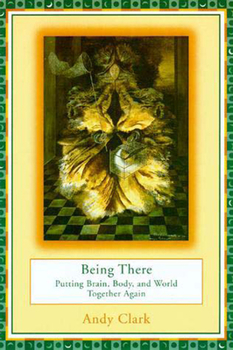Being There: Putting Brain, Body, and World Together Again
Select Format
Select Condition 
Book Overview
Brain, body, and world are united in a complex dance of circular causation and extended computational activity. In Being There, Andy Clark weaves these several threads into a pleasing whole and goes on to address foundational questions concerning the new tools and techniques needed to make sense of the emerging sciences of the embodied mind. Clark brings together ideas and techniques from robotics, neuroscience, infant psychology, and artificial...
Format:Paperback
Language:English
ISBN:0262531569
ISBN13:9780262531566
Release Date:January 1998
Publisher:MIT Press
Length:292 Pages
Weight:1.05 lbs.
Dimensions:0.7" x 5.9" x 9.0"
Age Range:18 years and up
Grade Range:Postsecondary and higher
Related Subjects
Artificial Intelligence Behavioral Sciences Cognitive Psychology Computer Science Consciousness & Thought Health, Fitness & Dieting Health, Fitness & Dieting Mental Health Philosophy Politics & Social Sciences Psychology Psychology & Counseling Science Science & Math Science & Scientists Science & Technology Theory of ComputingCustomer Reviews
5 ratings
Read even if your interest is cognitive psych and not philosophy
Published by Thriftbooks.com User , 14 years ago
I am reading Clark's book to learn how the understanding of mind, brain, and action has changed since I got a doctorate in cog. psych many decades ago. I am learning a lot from it. Being There clarifies several complex issues by, among other things, providing vivid examples. My only criticisms are minor: - About halfway through the book, it started to get a bit repetitive. I didn't need to be told again and again that perception and cognition are active and use the world as its own memory. - There are a few errors. E.g., page 29 puts the area of high visual resolution (i.e., the fovea) at "0.01 percent" of the retina. It's 1 percent (0.01) of the retina, not 0.01 percent.
Great reading on the Mind-Body problem
Published by Thriftbooks.com User , 21 years ago
Andy Clark provides us with a new framework for thinking about the mind. Gone are the old notions of a clean boundary between the thinker and the world. Clark does a great job of making the point that our brains are essentially embodied agents that profit profoundly from the local environmental structure. He introduces this new movement in cognitive science to study the brain, body, and world together as a complex system of interactions and dependencies and calls for a cognitive science of the embodied mind. Clark is not proposing a radical idea. In fact, he defends at some length that his work is in fact a solution to the radical ideas that currently dominate the field. Clark suggests refining the tools of study used, and finding a middle ground between competing theories. I personally question whether a middle ground is appropriate in science. When anomalies exist in current models, does it serve us well to take the best of all available theories and smooth them together as Clark does? Perhaps in the case of the brain, this is a good idea, even though many other sciences (like physics) fair better with simpler one-size-fits-all solutions. Due to the brain's complexity unmatched anywhere in the known universe, maybe a simple (radical) way of studying it isn't possible (or at least within human capabilities). Clark certainly builds a strong case, particularly by applying examples and comparisons throughout the book. His ideas are well thought out, his writing is clear (though perhaps a little repetitive), and the book as a whole is well worth reading. Being There definitely gets you thinking.
A New Approach to Philosophy of Mind
Published by Thriftbooks.com User , 23 years ago
For those dissatisfied with both dualism and West Coast eliminative materialism, Andy Clark's philosophy of mind offers readers an alternative: an embodied mind. Here's a philosophy that embeds the human mind in its environment, its culture, and its history. And and author who writes like a dream! For a revitalized philosophy of mind, read it together with Alicia Juarrero's Dynamics in Action: Intentional Behavior as a Complex System and Merlin Donald's Origins of the Modern Mind!Enjoy!
A new conceptual framework in the offing
Published by Thriftbooks.com User , 24 years ago
When read in tandem with Paul Cilliers Complexity and Postmodernism, and Alicia Juarrero's Dynamics in Action, Andy Clark's Being There articulates the outline of a new philosophical framework: one which takes complexity, embodiment, history and context seriously. Kudos!
probably the most readable and reasonable book on mind-body
Published by Thriftbooks.com User , 25 years ago
Clark develops in a very clear way the main threads of contemporary mind-body research. He argues for a non-dogmatic approach to the very difficult questions that epistemology, brain research and artificial life have put in the last twenty years. His position is with those who are not trying to explain everything from a single source or with single set of tools. Not reductionism, not holism or not only emergence or cognitivism or connectionism. Still, he sees the advantages of each theory and he gives a very subtle and insightful overview of what each strand has to contribute. I have read maybe twenty books on the subject in the past few months, from Varela to Jackendorf and from Minsky to Harré, but only Clark seems to be able to make the field transparent and coherent. If he sometimes loses in boldness, he certainly wins in promise. A book that should become a compulsary reading for anyone who wants to be introduced in the field.




